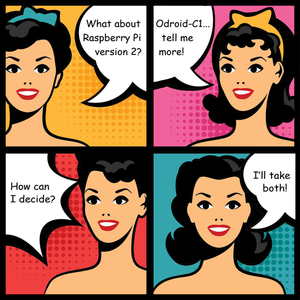Competitive Edge
A user wanting to buy a nano-computer might think that performance is all that matters. Comparing the Raspberry Pi 2 with the powerful newcomer Odroid-C1 shows that it is a good idea to consider other features as well.

Lead Image © Yulia Drozdova, 123RF.com
A user wanting to buy a nano-computer might think that performance is all that matters. Comparing the Raspberry Pi 2 with the powerful newcomer Odroid-C1 shows that it is a good idea to consider other features as well.
The Raspberry Pi clearly opened up the consumer market for an inexpensive ARM computer. However, the size of its main memory and its network speed limited the number of applications it was suitable for, thus creating an opportunity for competitors to get into the market.
The Raspberry Pi Foundation didn't leave its users out in the cold, however, but instead kept developing its product. Model B followed Model A, and then A+ and B+, and now finally version 2 [1]. Currently, the newest competitor for the Rasp Pi is a nano-computer named Odroid-C1. This board is made by a company out of South Korea called Hardkernel [3], which has already attracted attention for its Odroid models U3 and XU3.
Earlier this year, demand was high for both of these new small-board computers (SBCs). Beginners wanting to purchase one should look for a ready-to-use package that contains all the necessary components (e.g., covers, power supply, and possibly even a microSD card) in addition to the board.
[...]
Pages: 6
Price $15.99
(incl. VAT)